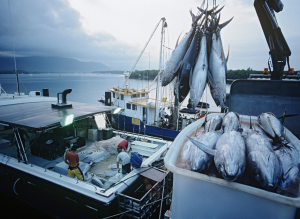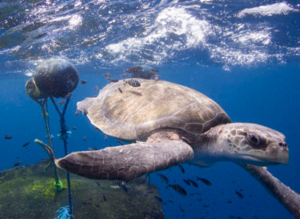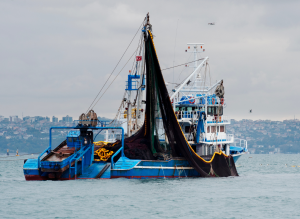This article was first published in the INFOFISH International, Issue 6/2022 (November/December 2022)
By Emilia Dyer and Martin Purves
While some fishing subsidies help in sustainable resource management, most have contributed to decimation of
stocks by increasing the capacity of industrial vessels to overfish. Addressing this issue can have a number of
benefits, of which the most important is to bring about truly sustainable fisheries which conserve the oceans and
provide livelihoods for the small-scale sector. The International Pole and Line Foundation (IPNLF) says that the new
World Trade Organization (WTO)’s agreement on harmful subsidies is a step forward, but it does not go far enough and
that reforms to subsidies may be needed to make them more responsible and equitable.
 Decades of global fisheries subsidies, which often do more harm than good have landed us in hot water, but after a long week of deliberations at the World Trade Organisation’s (WTO) 15th Ministerial Conference in June 2022, an agreement on harmful subsidies was finally reached. This new agreement establishes some much-needed rules on how nations can allocate fisheries subsidies, but serious concerns remain about ongoing subsidies that provide an economic incentive for fishing to continue even when fish stocks are already declining and fishing is no longer profitable. So, why is it so important for fisheries and our ocean that we continue to work for the complete abolishment of harmful fisheries subsidies and is the recent WTO agreement as positive as it seems on the surface?
Decades of global fisheries subsidies, which often do more harm than good have landed us in hot water, but after a long week of deliberations at the World Trade Organisation’s (WTO) 15th Ministerial Conference in June 2022, an agreement on harmful subsidies was finally reached. This new agreement establishes some much-needed rules on how nations can allocate fisheries subsidies, but serious concerns remain about ongoing subsidies that provide an economic incentive for fishing to continue even when fish stocks are already declining and fishing is no longer profitable. So, why is it so important for fisheries and our ocean that we continue to work for the complete abolishment of harmful fisheries subsidies and is the recent WTO agreement as positive as it seems on the surface?
Since humans first began to fish on any scale we have demonstrated an inability to take only what we need. The exploitation of global fish stocks ramped up dramatically with the introduction of motorised vessels, and this has been especially true since the 1950s, with global fishing capacity and effort more than doubling while the nominal catch per unit of effort (CPUE) has comparatively decreased. So in effect, an increasing number of larger fishing vessels are using more sophisticated equipment to chase and catch fewer fish. Obviously such a situation is not sustainable.
The impacts of fishing on the ocean have been felt for decades, as we have polluted, damaged and fished beyond its limits, in many instances leaving behind altered ecosystems where marine organisms struggle to survive. Instead, our ocean is in danger of becoming a hot, acidic shell of its former self, dotted with dead zones, plagued by plastic and overfished beyond belief. We need to reverse the path we’re on and transform our food systems. Truly sustainable fisheries need to help secure livelihoods and restore ocean life by stopping overfishing and destructive fishing practices. Seafood production systems need to play their part in protecting and restoring ocean biodiversity, making a hopeful future for today’s and future generations possible.
Despite media coverage of plastic straws and bottles, the greatest threat to our ocean is industrial overfishing. We remove over 100 million tons of wild fish from the oceans every year, the majority of which are taken via destructive and non-selective fishing methods, such as bottom trawling, gill nets, and in tuna fisheries, the use of entangling drifting Fish Aggregating Devices (FADs).

Abandoned, lost, or otherwise discarded fishing gear (ALDFG) is increasingly of concern with the continued catching of target and non-target species (such as turtles, seabirds and marine mammals); alterations to the benthic environment; navigational hazards; beach debris/litter; the introduction of synthetic material into the marine food web; the introduction of alien species transported by ALDFG; and a variety of costs related to clean-up operations and impacts on business activities.
Sealife easily become entangled in, or are killed by, drifting FADs as well as abandoned and discarded fishing gear
Small-scale fisheries, including responsible methods such as one-by-one tuna fishing, are increasingly being squeezed out of markets, outcompeted by highly subsidised, industrial vessels often using more destructive fishing methods. Now over two thirds of the world’s commercial fish stocks are either already fished at maximum levels or are overfished. Intense fishing pressure over many decades has led us to this point of oceanic decline in abundance and diversity of life. As a result, we now have to pump money into the industry in order to keep it afloat. This comes in the form of subsidies.
Government subsidies for fisheries can come in a number of forms and whilst some are helpful, such as promoting conservation and sustainable fishery management, many are socially and environmentally harmful. The most harmful are those which reduce the operating costs of industrial fleets and subsequently encourage them, or facilitate them, to overfish. How? It allows larger fleets to go out further, staying at sea longer, and catching more fish. For example, harmful subsidies include reduced fuel costs or support to increase capacity of a fleet. Recent research found at least 60% of subsidies to be socially and environmentally harmful, amounting to over $22 billion annually. These subsidies effectively mean that taxpayers are paying industrial boats to degrade the environment and to destroy the food security and livelihoods of vulnerable coastal communities around the world.
Subsidies do more harm than good in a number of areas but addressing them can have a number of benefits. So what does this new WTO agreement do to facilitate the transition?
In propping up industrial overfishing, our current system facilitates further exploitation and biodiversity loss beyond the balance of the ecosystem. We are suffocating our ocean, at a cost to our pockets and our future. However, there is an alternative. $22 billion dollars worth of destructive subsidies every year could be our answer. If we can reallocate the harmful subsidies – those that increase fleet capacity and fund their extra effort to compensate for decades of overfishing, such as fuel subsidies – this money could be repurposed for positive reform. A 2020 study by the Organisation for Economic Cooperation and Development (OECD) found that reversing biodiversity loss of recent decades across both land and sea would cost $78 – 91 billion per year globally. However, governments currently spend $500 billion annually on practices that are harmful to the environment. In other words, ceasing funding to activities that are harmful to the environment would provide 5 to 6 times the amount of funding we would need to reverse the impacts on biodiversity. Similarly, a study by the Paulson Institute highlights the redirection of harmful subsidies as key to changing our systems to those that support biodiversity rather than destroying it.
Subsidies financially support industrial fisheries in an ocean that they have depleted to such an extent that they now often can’t survive without them. A global study found that 54% of high seas fishing grounds would not be economically viable given current catch rates, unless the industrial fishing fleets exploiting these grounds were propped up by government subsidies. Essentially, subsidies which increase capacity and a fleet’s ability to find fish, will encourage them to continue fishing at current catch rates, thereby further depleting global fish stocks. This, in turn, will result in the need to spend more money in the future to help fleets reach dwindling fish populations. Such a never-ending downward spiral that can only lead to disaster!
 Instead, ending capacity-related subsidies would limit the number of boats and the technology they’re equipped with, reducing fleet expansions as they fish more in balance with the bounds of the ocean, putting less pressure on fish stocks. Recovering fish stocks have obvious financial and ecological benefits for people and the planet in the long run.
Instead, ending capacity-related subsidies would limit the number of boats and the technology they’re equipped with, reducing fleet expansions as they fish more in balance with the bounds of the ocean, putting less pressure on fish stocks. Recovering fish stocks have obvious financial and ecological benefits for people and the planet in the long run.
One of the greatest downfalls of the WTO agreement is that it fails to address this critical issue. There are no measures to stop subsidies which enhance capacity and, crucially, nothing to prevent building new vessels which target fish stocks like tuna, many of which are struggling under the immense pressure from industrial fleets.
Subsidised industrial fleets have the capacity to overfish and crowd out the small-scale sector
Subsidies, both harmful and beneficial, are distributed disproportionately in favour of industrial fleets of developed nations. More than 80% of subsidies are allocated to large-scale, industrial fleets of nations such as China, Japan, the EU, Korea, Russia and the US. In terms of subsidies per landed value, industrial fisheries receive twice as many subsidies per dollar landed than small-scale fisheries! After accounting for the difference in employees, the study found that an industrial fisher receives as much as 3.5 times more subsidies than a fisher involved in a small-scale fishery. There is obviously still a long way to go in terms of the equitable distribution of fishing subsidies.
This disproportionate distribution keeps small-scale fisheries, often based in low income countries, on the back foot and allows dominant fishing nations to send more distant water fleets into the waters of remote coastal communities. Research has found that most fisheries subsidies are given out by developed nations but that the ecological burden of their fishing activities is concentrated in the waters of developing nations and small-island developing states. This means that low income countries with more sustainable fishing methods are subjected to the consequences of overfishing without reaping any of the benefits of having caught so many fish previously, because resources in their region are being sold by other nations in other countries.
By ending harmful subsidies, and redistributing the funds, we could level out the oceanic playing field and give small-scale, low-impact fisheries a better chance in the markets. Unfortunately, the WTO agreement is yet to outline any guidelines for the equitable distribution of fishing subsidies, or how to reduce the impacts on developing, coastal nations.
Transparency across industries is a driving force towards a more environmentally sustainable, equitable future. As an industry that operates largely out of sight, increasing transparency in fisheries is an essential component to moving forwards. This is especially true for fisheries operating on the high seas as the high seas are considered a common good and no state owns these resources. Increased transparency will help to hold fisheries accountable for their operations, empowering consumers to make informed choices. Historically, there has been a heavy veil over fisheries subsidies and governments haven’t been required to disclose information about them.
This is however about to change. One of the most positive outcomes of the new WTO agreement is that it improves transparency by mandating states to disclose the subsidies they grant to their fisheries. This is a significant step forward as these increased levels of transparency, making more information publicly available, will help drive change and hopefully speed up the phasing out of many harmful subsidies.
We are all dependent on the ocean ecosystem, not least, the fishing industry itself. Therefore, ending harmful subsidies should be seen as an opportunity to redirect funds, which have previously been used to facilitate the over-exploitation of our oceans, instead investing these to manage our fisheries effectively and operate in balance with nature, rather than against it.
Redirecting these funds to improve global biodiversity makes clear economic sense, especially when you factor in what would happen if we don’t begin to protect and restore ocean biodiversity. The crises of biodiversity loss and climate change share many of the same causes and solutions and need to be addressed concurrently. Recent analysis estimates that around half of global GDP (US$ 44 trillion) is highly or moderately dependent on nature – the pivotal role that natural capital assets and ecosystem services play in ensuring social and economic prosperity. Turning away from harmful subsidies and redirecting these funds can enable new investments benefitting fishing communities, national economies and marine ecosystems, and help transform our future. Instead of investing in over-exploitation, we should invest in the enforcement of international law on the high seas, research on the recovery of fish populations and the promotion of sustainable fishing practices, among other things.
Nature loss threatens our health and economies and it also undermines our efforts to tackle the climate crisis. Many governments and non-state actors are calling for a Nature Positive future where food systems do not result in biodiversity loss, habitat degradation and high levels of CO2 emissions, but instead help to protect and restore biodiversity, improve habitat resilience and remove carbon from the atmosphere. In doing so, we would reduce inequity in global food systems, promote sustainable fishing for the future and allow fish stocks to recover, ensuring that people around the world have access to sustainable food for generations to come.
Although the WTO has been kicking the ‘harmful subsidy’ can down the road for two decades, this new agreement does offer a glimmer of hope. Whilst important steps have been taken, and in future there will be greater clarity on how subsidies are allocated and spent, we still have a long road ahead to phase out all the harmful impacts of fisheries subsidies. The next step at the WTO will be for governments to fine-tune the details of the agreement at the next ministerial conference, possibly in late 2023, and to deal with some of the subsidies where agreement proved elusive. Indonesia, for instance, are pushing for the banning of state subsidies for fleets that operate on the high seas and for vessels that have switched their flag states. In tuna fisheries, the state subsidies that many distant-water fishing operations receive remains a serious issue that many feel undermines the long-term sustainability of these resources in the waters of coastal states.
Ultimately, what is needed are reforms to subsidies to make them more responsible and equitable. It’s not clear what will happen next, but the harsh reality is that our oceans, food systems, and coastal communities may not survive another two decades of putting off the issue. The opportunity to transform our future is within reach and we all need to play our part in pushing for further momentum on the complete abolishment of harmful subsidies.
Call on your government to put their actions where their mouths are. It’s time to deliver on meaningful legislation which ends and reinvests harmful subsidies to ensure a more just, equitable and sustainable future for all!